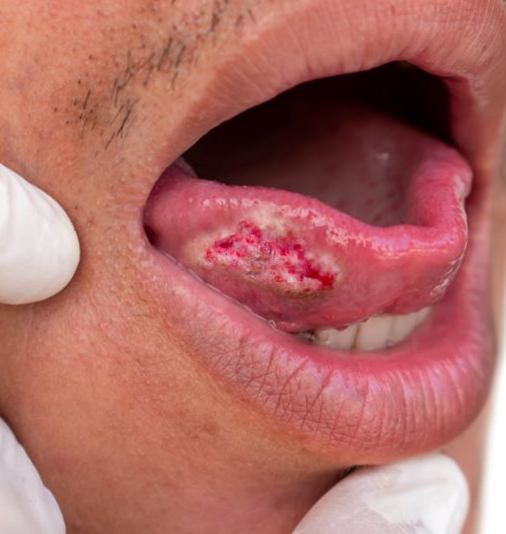Oral Cancer Screening – Salt Lake City, UT
A Simple Screening Could Save Your Life!
More than 10,000 people die of oral cancer each year. Sadly, this form of the disease is often not detected until it has already reached an advanced stage. It can wreak havoc on the body and have life-altering — or perhaps even life-ending — consequences. The good news is that survival rates for oral cancer are very high when the disease is detected early on. That is why we include an oral cancer screening for each patient who visits us for a periodontal exam in our Salt Lake City office. Continue reading to learn more about this important service.

Signs and Symptoms of Oral Cancer

In most cases, bumps, sores, and lumps in the mouth are harmless. However, it is always best to err on the side of caution. Getting checked out is especially important if you are experiencing any of the following:
- A persistent sore throat or hoarseness
- Ulcers in your mouth that do not heal
- Patches of white or red tissue in your mouth
- Lumps in or around your face and neck that are present for more than two weeks
- Pain or difficulty when swallowing
- Persistent mouth pain
- Ear pain
- Numb spots in or around your mouth.
What Does My Periodontist Look for During an Oral Cancer Screening?

During your screening, a member of our team will look for any tissue abnormalities in your mouth. Most oral cancers come in the form of scale-shaped patches on the tongue, floor of the mouth, or lower lip. However, they can also cause issues elsewhere, so we are always very thorough when screening for oral cancer, especially among patients who have risk factors for the disease, such as a history of smoking or HPV.
What Should I Expect During My Screening?

An oral cancer screening is simple, painless, and noninvasive. It involves both a visual and tactile examination. Not only will we look in your oral cavity, but we will also use gloved hands to palpate certain areas. We will also check the lymph nodes in your neck to see if there is any swelling. Additionally, we may ask you some questions about your daily habits, lifestyle choices, and medical history.
Diagnosis and Treatment

We cannot provide an official cancer diagnosis in our office. If we find any cause for concern during your screening, we will help you arrange for further testing, which usually involves a biopsy (a minor procedure that involves taking a sample of suspicious tissues). Once your results have been analyzed, you will know for sure whether an abnormal growth is cancerous. Thereafter, your doctor will be able to come up with a treatment plan based on the details of your unique case. Addressing oral cancer might involve surgery, chemotherapy, radiation, or other procedures.
